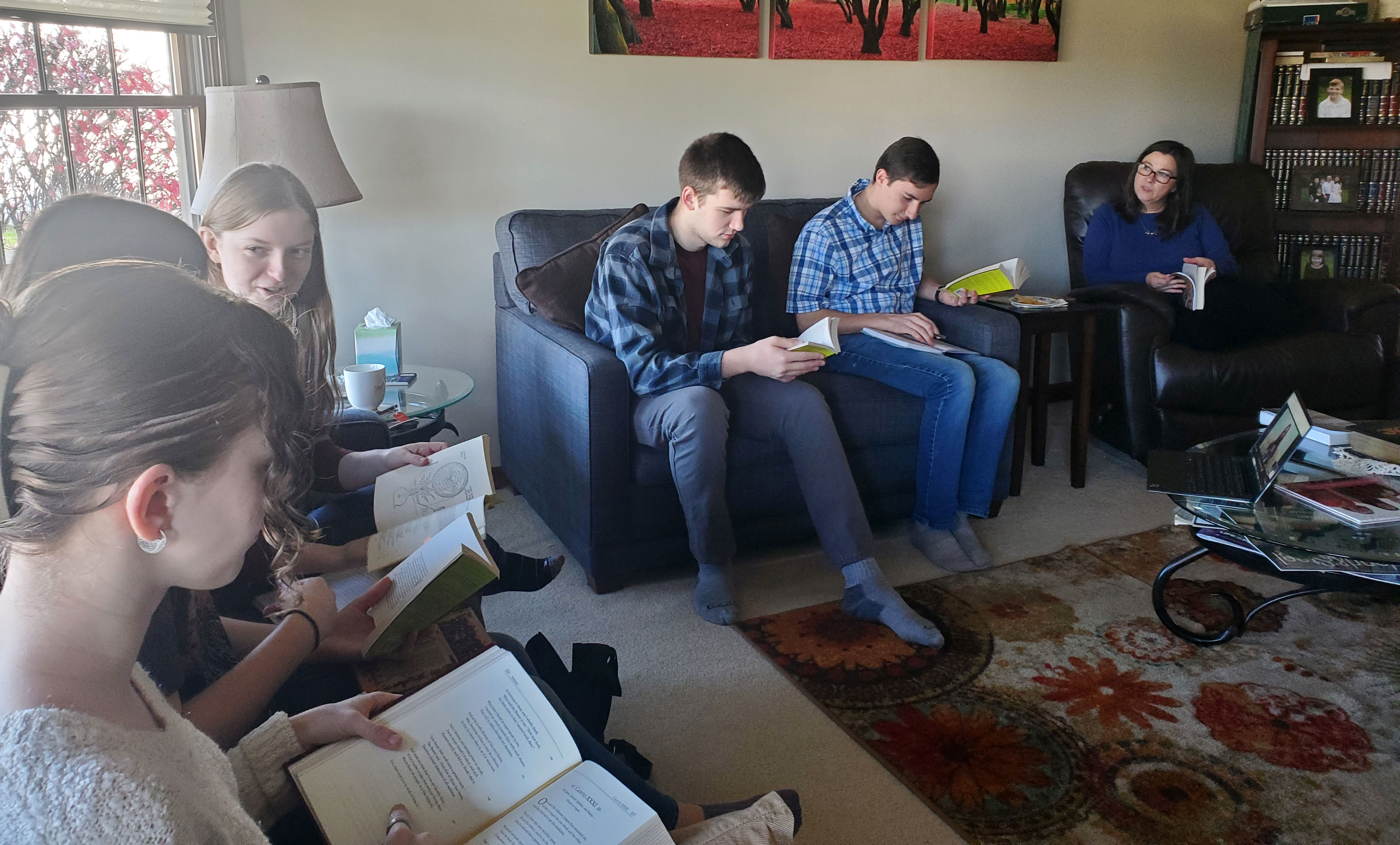Throughout 14 years of homeschooling my children, I have avoided teaching other people’s children like the plague. I briefly included a friend’s preschooler in a preschool/kindergarten science class with my children, but that was a rare exception to my utter lack of desire to teach beyond my three children.
But, the high school years have been my favorite with my own kids. Combined with my background working in higher education and guest lecturing for an upper division Humanities class taught by two of my former professors, I had more confidence that I might be helpful to other homeschooling families in my area of specialty.
And, an even deeper motivation for me was that my oldest daughter does better working with others and has thrived in her online courses. I knew she would work harder and get more out of classes if she was learning with peers.

Rachelle leading her literature class about The Divine Comedy
I’m by no means an “expert”, and these things certainly aren’t requirements to be a great teacher! However, I have found these tips immensely helpful on this new venture:
- Start from your strengths. This seems obvious, but teach what you know, whether it’s sewing, computer programming, or writing. My background is varied, but my degree is in the Humanities. My college courses involved a lot of reading, writing, and discussion, and now that I’m leading a class on The Divine Comedy, I am mining the richness of my favorite educational experiences.
- Be interested in what you are teaching. I’m also teaching an Economics course. While I didn’t formally study Economics, my interest has led me to do a lot of self-study and reading.
- Teach from experience. I’m teaching classes and using materials that I’ve already completed with my oldest child. This helps a lot with gauging how much material you can cover, lesson planning, and knowing what instruction works best.
- Think outside the box. Homeschooling, even in a co-op, should be different than a traditional school. Utilize guest lecturers who might bring something special to a discussion, online resources from true experts, and competition to make learning more interesting. Don’t be afraid to slow the pace and be sure key concepts are understood before you move on.
- Provide parents with the things you would want if you were them. For me, this means providing a syllabus that includes the goals of the course and what it will cover. The details include the credit value, the topics, reading list, and the grading rubric and expectations. Developing these things in advance makes it possible to keep up the grading and week-to-week planning. While this may depend on your co-op’s policies, I make the parent the final decision maker on what assignments are required for their child. This makes it possible to have multiple grade levels in the class, as well as incorporate special needs.
- Be transparent with students progress and grades. I find using a platform great for this. We are using Google Classroom because it is easily available to anyone, doesn’t cost anything, and allows me to post assignments and grades without a huge amount of technical knowledge.
- When possible, provide an Honors component. Some students are willing to do more than is required, and I’ve enjoyed finding resources that go above and beyond normal requirements to create an honors component for the course. I’ve also found it beneficial to provide extra credit learning assignments for students who might have done poorly on a quiz or test but care enough to put in the time to make up for it.
- Be objective but firm. I have been amazed at how much fun it is to interact with high school students. For the most part, I have eager, invested students who outperform my expectations. But, I have had some who don’t do the work. Having straightforward assessments in the form of quizzes and homework with clear point value takes the subjectivity out of it for me so I don’t have to “feel bad” about assigning a low grade.
One of the benefits of co-ops, particularly during the high school years, is the preparation my students are getting in learning from different teachers, with different styles, expectations, and assessment tools. In addition, my students are getting to know the methods for study and time management that other students bring to the table, which they find extremely helpful. The increased peer interaction, and experience with different teachers helps students develop confidence that will help them springboard successfully to higher education.
As exhausting and time-consuming as all the extra grading and preparation are, my students teach me, challenge me, and push me to a deeper knowledge. Teaching them has given me an even richer appreciation for homeschooling and admiration for the sacrifices their parents make to give their kids the very best.
—Rachelle

